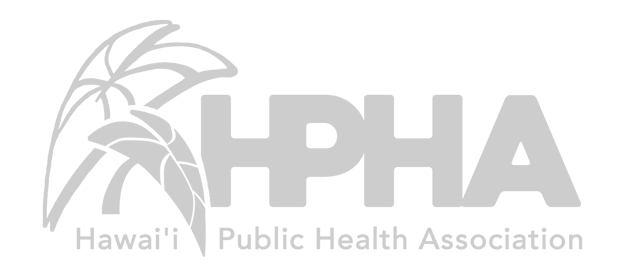HPHA's Statement on Racial Justice & Health Equity - June 2020
Dear HPHA ʻOhana,
The Hawaiʻi Public Health Association (HPHA) joins voices in Hawaiʻi, the continental U.S. and around the world in denouncing the use of violent force in the unjust killing of Mr. George Floyd, Ms. Breonna Taylor, Mr. Ahmaud Arbery and countless others at the hands of the police.
Police violence, a public health crisis.
In 2018, the American Public Health Association (APHA) declared law enforcement violence a public health issue. APHA’s policy statement 201811 describes the many law enforcement structures, systems, regulations, policies and practices that lead to disproportionate police violence against marginalized populations, namely people of color; immigrants; individuals experiencing houselessness; people with disabilities; lesbian, gay, bisexual, queer and transgender communities; individuals with mental illness; people who use drugs; and sex workers. In addition, the 2018 statement provides evidence regarding the immediate and long-term impacts of police violence on the health of marginalized individuals and communities, and presents several recommendations for action that incorporate upstream, public health strategies to address root causes of law enforcement violence.
Public safety is an essential part of public health; however, this important function has been almost exclusively delegated to law enforcement. Increasing law enforcement violence, as witnessed in the recent killing of George Floyd and others, shows that U.S. policing has failed to equitably deliver safety, placing an inequitable burden of mental and physical harm on marginalized populations. HPHA joins APHA in condemning police violence against marginalized communities and populations who experience racism and systemic oppression.
Racism, a public health crisis.
A growing body of research provides evidence of racism as a fundamental cause of adverse health outcomes for racial/ethnic minorities and racial/ethnic inequities in health. Racism is a public health crisis underlying the disproportionate burdens of violence, trauma, mental illness, injury, disease, and death affecting the communities of Black, Indigenous and People of Color (BIPOC). This has been particularly pronounced during the ongoing COVID-19 pandemic.
George Floyd’s death and the COVID-19 pandemic have exposed the disproportionate impact that policing and disease continue to have on BIPOC communities worldwide. These simultaneous pandemics demonstrate the interconnectedness of health to structural inequalities in access to quality health care, healthy food, and opportunities in employment, housing and education. APHA Executive Director, Dr. Georges Benjamin asserts that “racism has rocked this nation and is tantamount to a public health crisis”.
HPHA recognizes racism as a driving force of social determinants of health and equity - a longstanding, systemic problem that many in Hawaiʻi’s public health and healthcare communities witness and experience firsthand and work tirelessly to overcome. As such, HPHA supports the Black Lives Matter movement by standing up against systems and policies that perpetuate racism, police brutality, social injustice, and health inequities. We stand behind our vision of health equity for all, and recommit to efforts to eliminate systems, policies, and practices designed to perpetuate systemic racism and limit opportunities for Black, Indigenous, and People of Color.
HPHA calls on the energies and expertise of our 500+ members to help shape the critical decisions that will affect communities now and for years to come. We encourage HPHA members and the larger public health community to join us in efforts to advance health equity and racial justice, starting with the actions proposed below:
Advocate: Actively participate in efforts to find solutions to the problems exposed by police violence at the national, state and local levels; engage law enforcement, government, policy and community leaders in conversations to reimagine alternative ways to achieve public safety in Hawaiʻi. Support legislation, policies, practices, surveillance, and research that include a health equity lens and framework across all sectors of society.
Build capacity. Expand our knowledge and skills to integrate racial equity into practice. Promote, contribute to and participate in learning and growth opportunities, including programs co/sponsored by HPHA, APHA, and partners in health equity and racial justice. Contribute to the development of a HPHA-supported resource page/portal on racism and health equity.
Lean In. Create the space for the difficult and deep conversations around race, racism, and law enforcement violence and reform. Look inward by revisiting HPHA’s policies, procedures, practices, culture and relationships to explore how racism exists within the framework of our all volunteer-led membership organization; adopt changes needed to ensure that we live up to our mission, vision and values.
Organize, Vote and Participate. Organize around voting in the upcoming local, state and national elections as well as statewide participation in the U.S. 2020 Census. Encourage members to vote with a social conscience and contribute to local, state and national voter registration efforts. Research the health equity-related positions and policies of candidates running for local, state and national elections. Participate in the U.S. 2020 Census and support community-led efforts to increase statewide participation in the U.S. 2020 Census.
Respectfully,
Hawaiʻi Public Health Association
Hali Robinett, MPH, President
Pedro Haro-Arvizu, MPH, President-Elect
Elizabeth McFarlane, PhD, Secretary
Michelle Tagorda, MPH, Treasurer
Tenaya Jackman, MPH, Affiliate Representative to the Governing Council, APHA
Colby Takeda, MPH, MBA, Oʻahu Director At-Large
Jermy Domingo, DrPH, Oʻahu Director At-Large
Patricio Battani, MPH, Oʻahu Director At-Large
Camonia Graham-Tutt, PhD, Oʻahu Director At-Large
John A.H. Tomoso, MSW, Director At-Large (Maui Island)
Lenard Allen, MA, Director At-Large (Hawaiʻi Island)
Jill Tamashiro, MPH, Hawaiʻi State Department of Health, Ex-Officio
Gillian Dunn, DrPH, Department of Public Health, Hawaiʻi Pacific University, Ex-Officio
Vanessa Buchthal, DrPH, Office of Public Health Studies, University of Hawaiʻi, Ex-Officio
